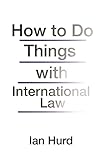How to Do Things with International Law / Ian Hurd.
Material type: TextPublisher: Princeton, NJ : Princeton University Press, [2017]Copyright date: ©2018Description: 1 online resource (200 p.)Content type:
TextPublisher: Princeton, NJ : Princeton University Press, [2017]Copyright date: ©2018Description: 1 online resource (200 p.)Content type: - 9780691196503
- 9781400888078
- International law
- Rule of law
- POLITICAL SCIENCE / International Relations / Treaties
- Activism
- Adobe
- Advisory opinion
- Al-Qaeda
- Ambiguity (law)
- Amendment
- Anne-Marie Slaughter
- Attempt
- Codification (law)
- Coercion
- Combatant
- Constitutionalism
- Contract
- Custom (law)
- Declaration of war
- Deliberation
- Determination
- Dissent
- Due process
- Explanation
- Federal government of the United States
- Foreign policy
- Geneva Conventions
- Global governance
- Global politics
- Governance
- Government
- Great power
- Humanitarian intervention
- Ideology
- Institution
- International Court of Justice
- International human rights law
- International humanitarian law
- International law
- International organization
- International relations theory
- International relations
- International security
- Jurisdiction
- Justifiable homicide
- Law of obligations
- Law of the United States
- Law of war
- Lawfare
- Legal instrument
- Legal personality
- Legal positivism
- Legalism (Chinese philosophy)
- Legality
- Legalization
- Legitimacy (political)
- Legitimation
- Liberal internationalism
- Martha Finnemore
- Michael Hardt
- National security
- Non liquet
- Non-interventionism
- Nuclear weapon
- On War
- Openness
- Permanent Court of International Justice
- Policy
- Political science
- Political structure
- Political system
- Politics
- Positivism
- Power politics
- Public diplomacy
- Public international law
- Regulation
- Requirement
- Responsibility to protect
- Result
- Rhetoric
- Right of self-defense
- Rome Statute of the International Criminal Court
- Rosa Brooks
- Rule of law
- Social theory
- Sources of international law
- Sovereign state
- Sovereignty
- Standing (law)
- Statute
- Taliban
- Targeted killing
- Territorial integrity
- Terrorism
- Torture
- Treaty on the Non-Proliferation of Nuclear Weapons
- Treaty
- United Nations Convention against Torture
- United Nations Security Council
- Use of force by states
- War crime
- War
- Westphalian sovereignty
- 341 23
- KZ3410
- online - DeGruyter
| Item type | Current library | Call number | URL | Status | Notes | Barcode | |
|---|---|---|---|---|---|---|---|
 eBook
eBook
|
Biblioteca "Angelicum" Pont. Univ. S.Tommaso d'Aquino Nuvola online | online - DeGruyter (Browse shelf(Opens below)) | Online access | Not for loan (Accesso limitato) | Accesso per gli utenti autorizzati / Access for authorized users | (dgr)9781400888078 |
Frontmatter -- Contents -- Acknowledgments -- 1. Introduction -- 2. Rule of Law, Domestic and International -- 3. How to Do Things with International Law -- 4. The Permissive Power of the Ban on War -- 5. The Rule of No Law: Nukes, Drones, and the Horror Vacui -- 6. Torture: Legitimation and Legality -- 7. The Empire of International Legalism -- Notes -- Index
restricted access online access with authorization star
http://purl.org/coar/access_right/c_16ec
A provocative reassessment of the rule of law in world politicsConventionally understood as a set of limits on state behavior, the “rule of law” in world politics is widely assumed to serve as a progressive contribution to a just, stable, and predictable world. In How to Do Things with International Law, Ian Hurd challenges this received wisdom. Bringing the study of law and legality together with power, politics, and legitimation, he illustrates the complex politics of the international rule of law.Hurd draws on a series of timely case studies involving recent legal arguments over war, torture, and drones to demonstrate that international law not only domesticates state power but also serves as a permissive and even empowering source of legitimation for state action—including violence and torture. Rather than a civilizing force that holds the promise of universal peace, international law is a deeply politicized set of practices driven by the pursuit of particular interests and desires. The disputes so common in world politics over what law permits and what it forbids are, therefore, fights over the legitimating effect of legality.A reconsideration of the rule of law in world politics and its relationship to state power, How to Do Things with International Law examines how and why governments use and manipulate international law in foreign policy.
Mode of access: Internet via World Wide Web.
In English.
Description based on online resource; title from PDF title page (publisher's Web site, viewed 01. Dez 2022)


